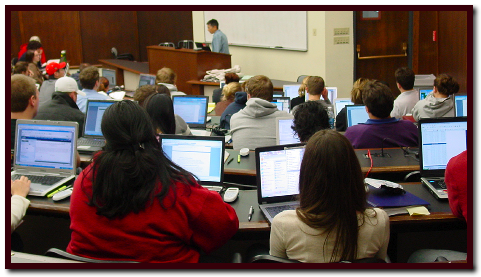« April 04, 2010 - April 10, 2010 | Main | April 18, 2010 - April 24, 2010 »
April 15, 2010
Well, do they, punk?
Customers, clients, buyers: the Keepers. "Do Your Best Customers Know They Are?" St. Louis-based Matt Homann asks us at his enduring the [non]billable hour. A gem.
Posted by Holden Oliver (Kitzbühel Desk) at 11:59 PM | Comments (0)
The Real Tax Day: February 3, 1913 and Amendment XVI
The Congress shall have power to lay and collect taxes on incomes, from whatever source derived, without apportionment among the several States, and without regard to any census or enumeration.
April 15 has been federal Tax Day--now "Cyber Tax Day"--for individuals in America since 1955. While the income tax system really started here during the Civil War, it got jump-started by the 1895 U.S. Supreme Court decision (5-4 vote) in Pollock v. Farmers' Loan and Trust Company. In Pollock, the Court declared unconstitutional a federal income tax on income from certain stocks and bonds, and thereby invalidated part of an 1894 act that imposed a direct tax on the incomes of U.S. citizens and corporations.
The 16th Amendment was proposed by Congress on July 12, 1909, and finally ratified by the states on February 3, 1913 (1,302 days). It mooted Pollock. The amendment was rejected by New Hampshire, Arkansas, Connecticut, Rhode Island and Utah. Other tax days: the original was March 1, 1913. Between 1918 and 1954, it was March 15.

Going over trial strategy: The IRS stuck Judy Garland with huge tax bills in the 1960s.
Posted by Holden Oliver (Kitzbühel Desk) at 11:59 PM | Comments (2)
April 14, 2010
To American law schools: A little help, please?
The tone and atmosphere of an excellent law firm that quickly resolves problems and gets things done?
Often it will be more like Rahm Emanuel, John Wayne or Colonel Bill Kilgore in "Apocalypse Now" commanding brainstorming, hard-ass and fully-engaged troops.
It it will be less like Mr. Rogers or Alan Alda whispering kind and nurturing things to the latest crop of Teletubbies and making sure they are okay. Big Bird and Care Bears in the trenches is not an image most of us wish to project to clients.
We are desperate--and burning daylight and money here. Marc Randazza is a San Diego-based First Amendment specialist who writes The Legal Satyricon. Like the undersigned, he is hard-working, works out of several offices, and is obviously having fun. Randazza is irreverent, "not prissy", passionate, mega-competent, and not concerned about what people think. Hear his April 2 NPR interview on SLAPP suits. Or read about abolition of limitations periods in clergy child abuse cases in "If you’re still Catholic...". He and his other writers don't cower behind "anonymity" when they write. Randazza's his own man, and a stand-up guy.
In short, an American. And none of this would be that unusual except that Marc is an American lawyer. And let's face it. Being eccentric, wild and/or "edgy" in American Lawyerland is not a tough mark to hit. Just wear a bow-tie, tasseled loafers and a trench coat. But maybe, say, in public, and wear them all on once, and on a weekday.
One year ago this week, Marc wrote "The Worthlessness of American Legal Education", a piece we admired and which is certainly worth your time to read. The theme "what should we expect now from law schools, anyway?" has legs at Marc's blog and others.
We've written about that theme--from the standpoint of clients as always being the "main lawyer event"--here at this blog for nearly five years. And written about it enough to know it's a very touchy subject.
In the late summer of 2008, we wondered aloud--and just weeks before the federal government's late "announcement" that there was a "recession goin' on"--on whether law students and recent grads should start paying law firms (yes, new lawyers pay the firms) for training to be lawyers who could add value in a shorter amount of time.

Law Schools: Weenie Factories? Or Places of Training to add value to client work? Lawyering is not necessarily a "PC", gentle or even genteel culture. Do law schools tell students it is?
In fact, our August 27, 2008 post was probably our most clicked-on but yet "unpopular" piece: "Should associates pay their law firms in the first 2 to 3 years?"
American law schools are some of the most impressive places of higher education in the world. They are exciting intellectually, great think tanks for business, and attract mega-talented humans, particularly in the quality of faculty. They hatch presidents, senators, captains of industry, great authors and diplomats. But many law firms these days are meeting new grads who won't be even marginally productive for two to three years. Or longer. And new grads--at a shop that actually tries to train you--often (not always) "get more" than the firm does out of the relationship in those years.
Law schools, certainly, are not in business to pay students to be trained. Students pay the tuition--not the reverse. The schools get the money. The schools don't pay the students to be there to learn.
Which gets us wondering again. Why should law firms pay new grads--even top students from fine schools--if they are often years away from being productive, and the law schools, for all their promise, potential and cache, are doing about 10% of the lawyer-creating job?
In many instances, the new grad is the only real beneficiary in the law firm-employee relationship. Turnover everywhere is relatively high. Many firms get zilch--and start over again. The current situation is bad for clients because it compromises value--and it cannot be good for students who think they are equipped to add value when they are not even close.
We suspect that legal education in recent years appears to have done many students a disservice by making them think that law school--by its very nature of being focused on teaching you "to think" like a lawyer--could ever give students more than 10% of what they need to be full-gauged lawyers and problem solvers.
Law done right is a hands-on profession and takes everything you have, and organizational and managerial skills the schools cannot teach or be expected to teach.
"Thinking like a lawyer" does not inform your every synapse, breath, and moment.
Moreover, lawyering is not necessarily a "PC", gentle or even genteel culture. Are the schools telling them it is?
To be fair, the substance of the work at a client-focused law firm doing higher-end problem-solving (in deals, courts, international work, etc.) may be very cerebral and challenging. A feast of exhilarating ideas and causes. Lucky people leading a Life of the Mind.
But the actual tone of the same place is more like Rahm Emanuel or John Wayne commanding brainstorming, fully-engaged troops. It will be less like Mr. Rogers or Alan Alda whispering kind and nurturing things to the latest crop of Teletubbies. Big Bird and Care Bears in the trenches is not an image most of us wish to project to clients. (If we ever do that, please get a big net, okay? )
Bosses at law firms may be Coif, former Law Review editors, and writers of famous Matthew Bender tomes. But they are still bosses who "want stuff". They do not understand (or even like) younger people who can't get it for them. Many law firms are dominated by type-A problem solvers with strong personalities who live to get things done. Let's hope that never changes. It's good for the customers.
You may ask: has the "recession" or downturn in the global economy helped? Has it made students and graduates more likely to stick it out, and compensate for things they may not have gained from their legal educations? Are students and new grads "stepping up" to train themselves?
Answer: No. We, at least, are not seeing it. Nothing has changed.
And finally there's the question: Is it really necessary for law students to be in classroom settings for three years?
At a minimum, we wish that law schools could convey a few truths, and what might be called "old verities", to part-time clerks, summer clerks and grads:
1. Even for the most brilliant, motivated, resourceful and ambitious people, law practice is time-intensive and very hard--especially in the beginning.
2. Graduating from law school with top grades and willing to give practice the old Siwash try is only the beginning of your travail. Again, practicing law is hard. Even harder to learn how. And hard to maintain as years roll by at a comfortable and honorable level of quality. You don't get to say this much: "Sorry, Jack, but I'm on my break."
3. Real-life client problems pose extraordinary ambiguity and complexity (you can't "Google" the answers; you may fret over some projects and have to stay late; at first, it may interfere with your relationships and your "real life").
4. Maybe you'll find that private practice is not for you. It's not about the lawyers, courtliness, lawyer-centric cults of "professionalism", bar associations, wearing cool suits, prestige, money or being in a special club. If you stay in it for all that stuff, even if you make big bucks, you will regret it. No, you will hate it.
5. Clients. Talented people with JDs are legion. It's really about those you serve: the gritty details, hardships, and joys of "getting it right" for them.
(Photo: The Situationist)

(from a Dec. 21, 2009 JDH post)
Posted by JD Hull at 11:59 PM | Comments (2)
China depositions: So what's the deal this week?
Even though China signed a treaty with the U.S. on evidence in 1980, and acceded to the Hague Evidence Convention in 1998, China attached strings to both and, generally speaking, nothing really happens if you want to take a deposition in mainland China. One year ago Dan Harris at China Law Blog wrote "Taking Depositions In China. It Can Be Done. Just Kidding". He was inspired by several posts in early 2008 at the Experience Not Logic: Business and Law in China--which, by the way, is a dead-on if not perfect title for any website, blog, book or course about doing business in China. Read these links on taking evidence in China. Send us your own anecdotes, news, wisdom.
Posted by JD Hull at 12:59 AM | Comments (1)
April 13, 2010
"So what are you doing after the 21-gun salute, Stud?"
They call me The E-Man. Buy you a drink? Not one thing about the never-ending Congressman Eric Massa story as reported so far is new or different in sexual misadventures on Capitol Hill over the past 30 years. Even the February 2nd bartender-at-the-wake episode, which occurred in Hornel, New York, is a bit tame, and old hat.
Weirder things have happened in Congressional offices, in the storied Longworth HOB, and of course at DC wakes, especially the seriously-Irish ones. And have happened to ex-military people like Eric Massa. Or to their DC bartenders, a feisty form of royalty in the Beltway. A word about DC bartenders: no one should take liberties with them, or try. They are much tougher than New York (City or State) barkeeps. Never offend a 1988 graduate of Georgetown or GW who's tenured at Clyde's or Bullfeathers, and still plotting his next move.
A new bad Massa at The Last Plantation? Certainly, "first complaint" internal investigations have been way more botched. Still, past tawdriness levels may have been exceeded here. See The Washington Post and Carol Leonnig's reporting in "Staffers' Accounts Paint More Detailed, Troubling Picture of Massa's Office". Do give retired Naval commander and ex-Rep. Eric Massa (D-NY) a point or two for resigning back on March 8--that is different--and let's wait for the results of the full and tardy investigation.
Okay, sailors?

Longworth HOB
.jpg)
Posted by JD Hull at 11:59 PM | Comments (0)
Writing as perfect Hell.
I am irritated by my own writing. I am like a violinist whose ear is true, but whose fingers refuse to reproduce precisely the sound he hears within.
--Gustave Flaubert (1821-1880)

Posted by Holden Oliver (Kitzbühel Desk) at 11:59 PM | Comments (0)
April 12, 2010
Answer: Way Crappy. Trust us.
A new referendum on TeleTubbies, Looters and the 'Wazee? See at Above The Law Friday's "Corporate General Counsel Puts Fear of God into Legal Educators" and today's "Just How Crappy Is Legal Education Today?" Below is the best new what-everyone-else-was-thinking-anyway-but-too-wimpy-to-say quote about new associates by in-house Paul Beach, after whom I am naming my next born legitimate child of either gender:
We don’t allow first or second year associates to work on any of our matters without special permission, because they’re worthless.
Posted by JD Hull at 11:59 PM | Comments (0)
The Client's Stock Price Last Week? This Week?

Blaise (above checking share prices of companies) is about to get out of law school. She won prizes in Contracts and Evidence--and knows the difference between Whitman, Wordsworth and Whittier. She never feels sorry for herself. She thinks it's a privilege to just work. If your firms hires her, even part-time, you may be gone in a matter of weeks.
Take time out to learn the stock price, industry, day-to-day culture, players and overall goals of your client. Visit offices and plants. Don't charge for it.
Associates in particular need to develop the habit of finding out about and keeping up with clients and their trials and tribulations in and out of the areas they are working in. Learn about your client--but keep learning about it.
No, a Google search twice a year won't cut it. Devise a system to keep abreast.
The above is from past discussions about "Rule 7: Know the Client", in our annoying-but-correct 12 Rules of Client Service. The Client, it turns out, actually wants you to know him, her or it. Do honor--and keep--good clients by knowing them, and knowing them well. Start there.
Note: It's not about the lawyers anymore, and not about the law firms. Never was. Attorneys, in the U.S. especially, are a dime a dozen. Just not that big a deal. You signed up to serve. Get used to it. Know the client. Distinguish yourself. Surprise clients.
Posted by Holden Oliver (Kitzbühel Desk) at 11:43 PM | Comments (0)
April 11, 2010
Take time out to learn the stock price, industry, day-to-day culture, players and overall goals of your client. Visit offices and plants. Don't charge for it.
Associates in particular need to develop the habit of finding out about and keeping up with clients and their trials and tribulations in and out of the areas they are working in. Learn about your client--but keep learning about it.
No, a Google search twice a year won't cut it. Devise a system to keep abreast.
The above is from past discussions about "Rule 7: Know the Client", in our annoying-but-correct 12 Rules of Client Service. The Client, it turns out, actually wants you to know him, her or it. Do honor--and keep--good clients by knowing them, and knowing them well. Start there.
It's not about the lawyers, and not about the law firms. Never was. Attorneys, in the U.S. especially, are a dime a dozen. Just not that big a deal. You signed up to serve. Get used to it. Know the client.
(from past JDH and HO posts)
Posted by Holden Oliver (Kitzbühel Desk) at 11:41 PM | Comments (0)